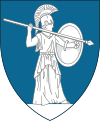Introduction
The European Union (EU) is a supranational political and economic union of 27 member states that are located primarily in Europe. The Union has a total area of 4,233,255 km2 (1,634,469 sq mi) and an estimated total population of over 449 million. The EU has often been described as a sui generis political entity combining the characteristics of both a federation and a confederation. Containing 5.8% of the world population in 2020, EU member states generated a nominal gross domestic product (GDP) of around US$16.6 trillion in 2022, constituting approximately one sixth of global nominal GDP. Additionally, all EU states except Bulgaria have a very high Human Development Index according to the United Nations Development Programme. Its cornerstone, the Customs Union, paved the way to establishing an internal single market based on standardised legal framework and legislation that applies in all member states in those matters, and only those matters, where the states have agreed to act as one. EU policies aim to ensure the free movement of people, goods, services and capital within the internal market; enact legislation in justice and home affairs; and maintain common policies on trade, agriculture, fisheries and regional development. Passport controls have been abolished for travel within the Schengen Area. The eurozone is a group composed of the 20 EU member states that have fully implemented the economic and monetary union and use the euro currency. Through the Common Foreign and Security Policy, the union has developed a role in external relations and defence. It maintains permanent diplomatic missions throughout the world and represents itself at the United Nations, the World Trade Organization, the G7 and the G20. Due to its global influence, the European Union has been described by some scholars as an emerging superpower. In 2012, the EU was awarded the Nobel Peace Prize. The United Kingdom became the only member state to leave the EU, in 2020; ten countries are aspiring or negotiating to join it. (Full article...) Selected article The Treaty of Lisbon or Lisbon Treaty (initially known as the Reform Treaty) is an international agreement which amends the two treaties which form the constitutional basis of the European Union (EU). The Lisbon Treaty was signed by the EU member states on 13 December 2007, and entered into force on 1 December 2009. It amends the Maastricht Treaty (also known as the Treaty on European Union) and the Treaty establishing the European Community (TEC; also known as the Treaty of Rome). In this process, the Rome Treaty was renamed to the Treaty on the Functioning of the European Union (TFEU). Prominent changes included the move from unanimity to qualified majority voting in several policy areas in the Council of Ministers, a change in calculating such a majority to a new double majority, a more powerful European Parliament forming a bicameral legislature alongside the Council of ministers under the ordinary legislative procedure, a consolidated legal personality for the EU and the creation of a long-term President of the European Council and a High Representative of the Union for Foreign Affairs and Security Policy. The Treaty also made the Union's bill of rights, the Charter of Fundamental Rights, legally binding. Selected pictureDid you know?... that the presidency of the EU Council rotates every half year? ... that the EU parliamentary election is the world's biggest transnational election? ... that the European Union was awarded the Nobel Peace Prize in 2012? Selected cityAthens is the capital and largest city of Greece. Named after goddess Athena, Athens is a cosmopolitan metropolis with a population of 3.7 million people. The Athens metropolitan area constitutes the center of economic, financial, industrial, cultural and political life in Greece. The city is also rapidly becoming a business center in the European Union. Ancient Athens was a powerful polis city-state and a renowned center of learning, home of Plato's Academy and Aristotle's Lyceum. It is often referred to as the cradle of Western civilization, largely due to the impact of its cultural and political achievements during the 5th and 4th centuries BCE on the rest of the then known European Continent. The classical era heritage is still evident in the city, portrayed through a number of ancient monuments and artworks, the most famous being the Parthenon on the Acropolis. Athens was the host city of the first modern-day Olympic Games and, more recently, of the 2004 Summer Olympics. General imagesThe following are images from various European Union-related articles on Wikipedia.
TopicsFeatured contentFeatured articles
Featured lists
Featured contentGood articles
CategoriesRelated portalsAssociated WikimediaThe following Wikimedia Foundation sister projects provide more on this subject:
Discover Wikipedia using portals |































































